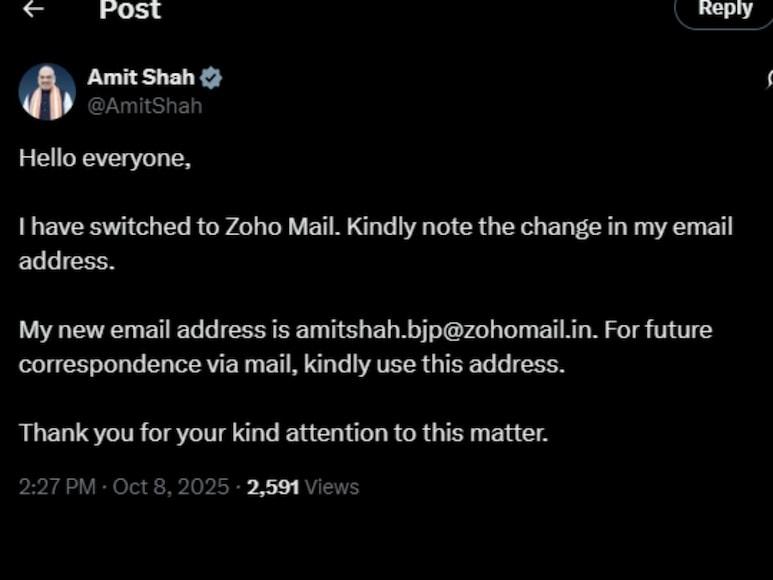Article Body
Amit Shah Adopts zoho mail as India’s Tech Moment Expands with IMC 2025

New Delhi, October 8, 2025 — In a symbolic boost to India’s growing self-reliance in technology, Union Home Minister Amit Shah announced he has officially shifted his personal and official email services to zoho mail, a homegrown alternative to Gmail. The announcement, made via a social media post, was quickly acknowledged by Zoho itself, with the company calling it “inspiring to see national leadership embrace Made-in-India platforms.”
Shah’s decision comes at a time when the country’s largest technology showcase, India Mobile Congress (IMC) 2025, has just opened in Delhi. The event, inaugurated by Prime Minister Narendra Modi, is set against the backdrop of India’s push to lead global digital transformation through innovations in 6G, quantum communication, semiconductors, and AI-driven financial systems.
Zoho’s Big Moment on the National Stage
Founded by Sridhar Vembu, Zoho Corporation has long been seen as one of India’s quiet success stories. Built without external venture capital, the company is now valued at over $12 billion and competes directly with tech giants like Google and Microsoft.
While Zoho has steadily expanded its footprint in more than 180 countries, Shah’s public endorsement could accelerate domestic adoption. Industry analysts say this move is not just symbolic but practical, reflecting rising concerns over data sovereignty and digital independence.
“Government leaders shifting to Indian platforms signals trust. It sends a message to both citizens and enterprises that global-scale alternatives exist right here,” said tech policy analyst Ananya Ghosh.
UPI without PIN: RBI’s Big Step Forward
Alongside Shah’s email shift, the day also marked another major leap for India’s fintech sector. At the Global Fintech Fest 2025, the Reserve Bank of India (RBI) and National Payments Corporation of India (NPCI) announced the rollout of biometric-based UPI payments.
With fingerprint and facial recognition authentication, users will soon be able to make transactions without entering a PIN. The feature also extends to ATM withdrawals, making India one of the first countries to integrate such advanced security at scale.
Experts believe this will not only increase convenience but also reduce fraud risks, especially as more rural and semi-urban users come online through affordable smartphones.
IMC 2025: Innovation at the Center
The India Mobile Congress, now in its ninth edition, is hosting over 400 companies from across the globe. This year’s theme, “Innovate to Transform”, underlines India’s ambition to become a hub for cutting-edge technologies.
Key highlights from the event include:
-
Demonstrations of 6G testbeds by Indian and international telecoms.
-
Quantum communication prototypes for ultra-secure networks.
-
Advances in semiconductor fabrication, a sector India is aggressively pushing to reduce import reliance.
-
A showcase of AI-powered cybersecurity solutions to counter rising digital threats.
Zoho’s Wider Ecosystem: Beyond Email
Shah’s adoption of Zoho Mail is only one part of a much larger story. Zoho today offers over 50 products, ranging from customer relationship management (CRM) tools to office productivity suites, positioning itself as a comprehensive business software provider.
The company has also made headlines with Arattai, a messaging app touted as a privacy-friendly alternative to WhatsApp, and Ulaa, a web browser designed to block trackers and protect user privacy.
What makes Zoho stand apart is its philosophy. Despite its billion-dollar valuation, Vembu continues to run the company from a rural base in Tamil Nadu, emphasizing frugality, local employment, and data ethics.
Why This Shift Matters
For many Indians, email may seem like a small detail. But for policymakers, platforms chosen for communication carry strategic weight. By moving away from Gmail, Shah has highlighted India’s broader agenda — reducing dependency on foreign tech ecosystems that dominate critical services.
“This is not just about convenience. It’s about signaling to the world that Indian solutions are ready to be adopted at the highest levels,” said Ramesh Menon, a digital governance consultant.
At a time when global debates around privacy, surveillance, and data localization are intensifying, Shah’s move may inspire businesses and government departments to rethink their tech choices.
The Road Ahead
With UPI expanding globally, India testing 6G ahead of most economies, and leaders endorsing indigenous platforms like Zoho, the country is carving out a new identity in the tech world.
For Zoho, Shah’s endorsement could become a watershed moment, encouraging more professionals, startups, and government institutions to explore homegrown digital tools. For India as a whole, IMC 2025 shows a nation not just catching up but shaping the digital future.
As Sridhar Vembu once said in an interview, “We don’t just want to build software for India. We want to build software from India, for the world.”
This week, that vision found a powerful new ambassador.

Comments